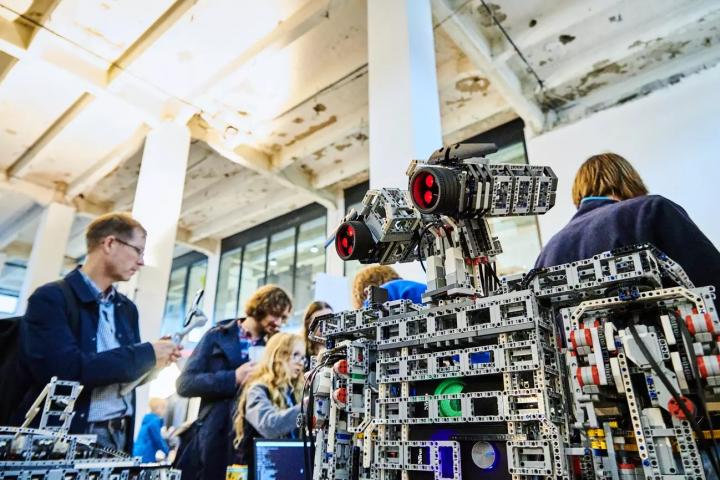
The Robocompetition "Superfinals" will start on Sunday, June 11. The best teams made up of secondary school students and students from the corresponding years of eight-year grammar schools will compete with robotic vehicles made from LEGO Mindstorms. "A total of 14 best teams advanced to the finals, which were competed in three separate preliminary rounds. From each preliminary round, the four best teams advanced and two received a wild card from the organizers," described the main organizer of the competition, Dr. Martin Hlinovský from the Department of Control Engineering at the FEE CTU. Sunday's competition will start at noon, with the announcement of the winning teams after 14:00.
Another varied programme combining robots and the popular robotics kit will be prepared by FEL representatives on both days of the festival. "The robotic LEGO corner will allow the youngest participants of the festival, aged from three to eight years, to play with LEGO and build whatever they want," described Hlinovský. "For the older ones, we are preparing several competitions during the Maker Faire where they will test their skills and teamwork. For those who are interested, we will have a robot that folds a rubik's cube, a keyboard-playing robot, a chess-playing robot and you can look forward to Ludwig the robot again," summarized Dr Hlinovský. The humanoid robot Ludvík, the work of students of the Department of Control Engineering, consists of more than 31,000 LEGO pieces and is a seasoned guest at scientific and popular events as well as cultural events.
Little robots, called Ozobots, will be the stars of the programme directed by members of the wITches faculty association. "At our stand we will introduce the children to the beauty of electrical engineering. They will be able to help our little friends, the Ozobots, through the maze, thus learning the basic principle of how a robot receives instructions," described Annamária Miheličová, a student of the CTU Faculty of Electrical Engineering on behalf of wITches. She noted that there will also be a workshop for making a "magic wand". "Not only can children learn about the basic components, but with our help they will also be able to try soldering. And for those who are musically gifted or just curious, our Banana Piano will be ready," Miheličová stressed.
Technique and art are also connected by an installation by two PhD students from FEE - Vojtěch Leischner and Pavel Husa. "The Pendulum, or Pendulum, is a musical instrument from a series of controllers that convert movement into sound, made by Pavel Husa and myself," Leischner described, noting that already in 2018 people could hear music created by juggling balls at the Prague Digital DIY Show. "The pendulum is based on previous work - it uses accelerometers and gyroscopes together with a wifi microcontroller," Leischner added.
An expert from the Department of Computer Graphics and Interaction at the FEE CTU explained that the pendulum's movement determines the direction from which the sound seems to come, so the listener has the feeling that it is circling around him. "But at the same time, the sound is also directly generated in real time, not only depending on the actual position of the pendulum, but also on the interactions between the two pendulums with each other. The simple rules thus create a complex listening experience," said Leischner, who works on computer vision, new media and spatial sound in the Department of Computer Graphics and Interaction. Pavel Husa, who works in the same department, is also a musician - he plays bass. And in the 4.5Ga~24h project, for example, he is musicalizing the evolution of planet Earth in collaboration with astrophysicists.
The Maker Faire will also involve a team from the FEE Department of Measurement, led by Dr. Vojtěch Petrucha. "The Department of Measurement will be presenting selected final projects of students from the Industrial Electronics Labs course, the latest additions to the family of software-defined measurement devices based on single-chip microcontrollers, which are suitable for novice tinkerers and for teaching," described Dr. Petrucha. "We will present the latest developments of the Open-Cube platform, as well as other interesting electrophysics experiments. As usual, most of the exhibits will be more or less interactive," the expert concluded.